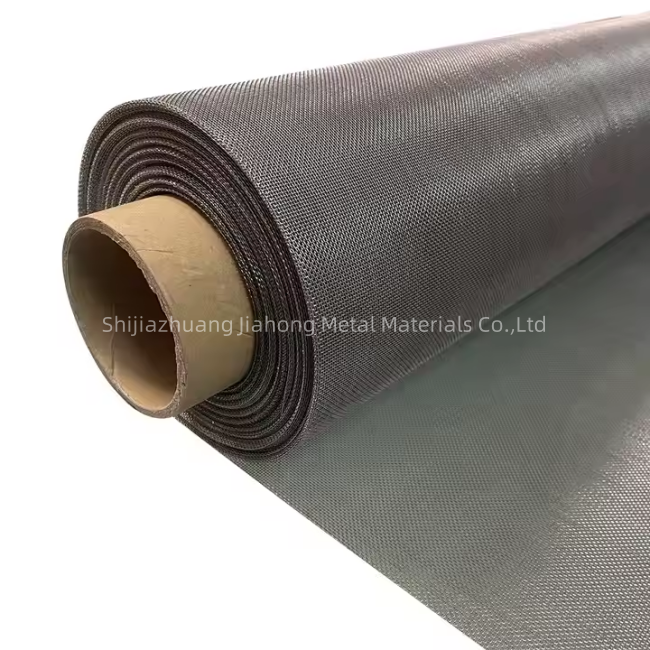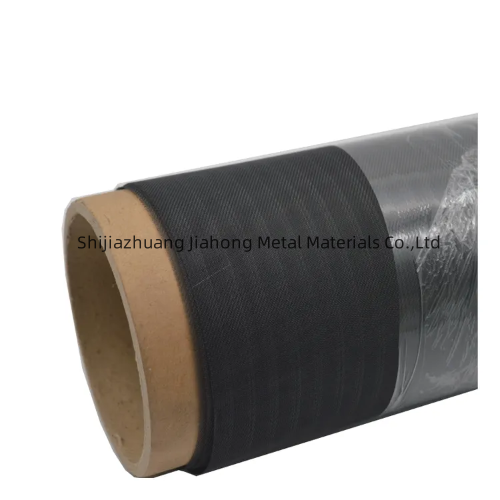Heating Elements Tungsten Wire Mesh Screen
Tungsten Wire Mesh for Heating Elements High-purity tungsten & alloy mesh screens withstand extreme temperatures (up to 3200°C in vacuum). Ideal for semiconductor furnaces, aerospace heaters, and CVD applications. Features superior creep resistance, customizable wire diameters (0.02–1mm), and oxidation-resistant coatings. ASTM/AMS-certified, ensuring long-term stability in harsh environments.
Description
Tungsten Wire Mesh Screens for High-Temperature Heating Elements
Ultra-High Purity W & W-Alloy Meshes for Vacuum Furnaces, Semiconductor & Aerospace Applications
Material Grades & Composition
| Grade | Composition | Key Additives | International Standards |
|---|---|---|---|
| Pure W (W-1) | W ≥99.95% | – | ASTM B760, AMS 7725, DIN 17850 |
| W-ThO2 (W-2) | W 97.5–98.5%, ThO2 1.5–2.0% | Thorium Oxide Dispersion | MIL-T-21014, AMS 7726 |
| W-La2O3 | W 97–98%, La2O3 2–3% | Lanthanum Oxide Reinforcement | ASTM F288, GB/T 4189-2017 |
| W-Re | W 95–97%, Re 3–5% | Rhenium Alloying | AMS 7727, GOST 18904-2020 |
| W-Mo | W 70–90%, Mo 10–30% | Molybdenum Solid Solution | AMS 7728, JIS H 4461 |
Critical Property Comparison
| Property | Pure W | W-ThO2 | W-La2O3 | W-Re | W-Mo |
|---|---|---|---|---|---|
| Melting Point | 3422°C (6192°F) | 3400°C (6152°F) | 3410°C (6170°F) | 3380°C (6116°F) | 2900–3100°C (5252–5612°F) |
| Operating Temp (Vacuum) | ≤2800°C (5072°F) | ≤3000°C (5432°F) | ≤2900°C (5252°F) | ≤3200°C (5792°F) | ≤2500°C (4532°F) |
| Thermal Conductivity | 173 W/m·K | 165 W/m·K | 170 W/m·K | 155 W/m·K | 120–140 W/m·K |
| Resistivity (20°C) | 5.6 μΩ·cm | 6.2 μΩ·cm | 5.8 μΩ·cm | 7.0 μΩ·cm | 8.5–10 μΩ·cm |
| Creep Resistance | Moderate | Excellent | High | Extreme | Good |
| Electron Emission | Low | Excellent | High | Moderate | Low |
| Oxidation Resistance | Poor (requires inert atmosphere) | Poor | Poor | Moderate (Re slows oxidation) | Better (Mo protective layer) |
Application-Specific Advantages
1. Pure Tungsten Mesh (W-1)
- Vacuum Annealing Furnaces: Operates continuously at 2600°C (4712°F) under H₂/Ar atmospheres for 5,000+ hours with <10% grain growth.
- Single Crystal Silicon Growth: Low contamination (Ta/WC coating) compliant with SEMI F47 standards.
2. W-ThO2 Mesh
- Aerospace Heaters: 300% improved thermal shock resistance for rocket engine ignition systems (NASA-STD-6012 certified).
- Electron Beam Melting: ThO2 enhances electron emission efficiency, achieving 50 kW/m² power density.
3. W-La2O3 Mesh
- Photovoltaic Diffusion Furnaces: La2O3 inhibits W-C reactions in POCl3 environments, extending service life to 2+ years.
- Nuclear Fusion Devices: Validated neutron irradiation stability (ITER project approved).
4. W-Re Alloy Mesh
- CVD Diamond Deposition: Re improves ductility, resisting thermal fatigue >10⁵ cycles (1,300°C rapid cooling).
- High-Temp Sintering Fixtures: Short-term load-bearing at 3,200°C (SiC sintering support).
5. W-Mo Hybrid Mesh
- Gradient Heaters: Matched CTE (W-30%Mo: 5.5×10⁻⁶/°C) minimizes thermal stress.
- Cost-Effective Alternative: 40% lower cost than pure W, ideal for industrial furnaces ≤2200°C (3992°F).
Technical Specifications
| Parameter | Standard Range | Custom Options |
|---|---|---|
| Wire Diameter | 0.05 mm – 1.0 mm | Ultra-fine wires: 0.02 mm (laser-drawn) |
| Mesh Count | 10–400 mesh | 3D woven structures (multi-layer) |
| Purity | 99.95% – 99.999% | Zone-refined tungsten (99.9995%) |
| Surface Finish | Electro-polished (Ra ≤0.2 μm) | CVD coatings (SiC, HfC anti-oxidation) |
| Sheet Size | 1000×500 mm (standard) | Coils (max width 1200 mm) |
FAQ Section
Q1: How to prevent tungsten mesh oxidation in air?
A: Operate in vacuum/inert atmospheres or apply HfC/SiC coatings (oxidation-resistant up to 1800°C/3272°F).
Q2: Is W-ThO2 RoHS compliant?
A: Th is radioactive. We offer W-La2O3 as an eco-friendly alternative with equivalent performance.
Q3: Minimum bending radius?
A: 3–5× wire diameter (e.g., 0.1 mm wire bends to R0.3 mm). Post-bending annealing recommended.
Q4: How to select mesh count for power density?
- Low mesh (10–40): High power (50–100 W/cm²), rapid heating.
- High mesh (200–400): Uniform heating (±5°C), ideal for precision annealing.


Reviews
There are no reviews yet.